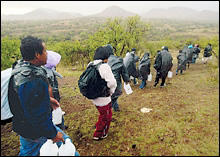
|  |  |  News Around the Republic of Mexico | August 2009 News Around the Republic of Mexico | August 2009  
Recession Ends Boom For Mexican Smugglers' Village
 Reuters Reuters
go to original
August 27, 2009


| | Toting water and their goods, migrants leave Sasabe for the US. (2004) |  |
El Sasabe, Mexico - As illegal immigrants flooded north through the sun-baked Mexican border town of El Sasabe to find work in the United States earlier this decade, shop keeper Ramona Flores thrived.

But with the U.S. economy hemorrhaging jobs in the recession, and security tightening in the desert corridor to the north, her business is off by a half as the town's smuggling boom turns to bust.

"The decline started a couple of years ago, and now we're in crisis," said Flores, 40, standing behind the counter of her store, empty but for one small girl paying for a bottle of soda with a few grubby peso coins.

"People don't want to go because they know they're not going to find work ... the American Dream has become a nightmare," added Flores, who is also the town's administrator.

Arrests on the southwest border dropped to 705,022 last year, their lowest level since the 1970s, according to a report last month by the U.S. Department of Homeland Security.

The study attributed the stark fall, from a mid-decade high of almost 1.2 million arrests, to a decline in U.S. economic growth and enhanced border security.

The one-two punch has hit El Sasabe hard. The town, which straddles illegal immigration's superhighway to Arizona, fed, watered and bedded up to 1,500 migrants a day from across Mexico and Central America in 2005, according to the migrant welfare agency Grupo Beta.

Many of the taco stands, stores and flophouse hotels that blossomed in the boom have shut their doors as the number of migrants making the trek has fallen to at most 250 a day. Others say they are struggling.

"We used to be pretty much full every night, although we haven't had a guest here in three days," said Alejandra Nunez, housekeeper at the Perla Hotel on the dusty main strip, which has 11 rooms, each with several beds.

"We're seeing more people heading to Mexico with their furniture and ... belongings."

HISTORY OF VIOLENCE

Border security and illegal immigration, particularly what to do with 12 million illegal immigrants living in the shadows, are thorny issues in the United States.

Last week, President Barack Obama entered the fray, announcing he would push comprehensive immigration reform this year.

He tapped Homeland Security Secretary Janet Napolitano to work through controversial issues with lawmakers, such as how to handle illegal immigrants already in the country, and how to prevent more from coming.

In past recessions, border apprehensions have declined, only to pick up again with recovery.

Residents in El Sasabe said the sharp fall in migrants had also been accelerated by drug cartel-related violence, which has claimed more than 2,500 lives since January in Mexico.

One local official, speaking on condition of anonymity, said cartels in northern Sonora state had killed several "coyotes" - as paying guides are known - to clear the desert borderlands for marijuana trafficking.

Residents said a spate of cartel murders in the rugged, border state had also scared away migrants.

"There's so many things happening south of us, there's a lot of killings ... people don't want to" go, said Gloria Grijalva, 41, who runs a small grocery store opposite a small, empty park that was once popular with migrants.

Despite additional security on the border, Flores said she felt the hardscrabble town's fortunes would revive once U.S. employers started hiring again.

"When the United States recovers, people will go, I'm convinced of that," said Flores. "They'll cross wherever they have to."

(Editing by Doina Chiacu) |

 |
|  |



